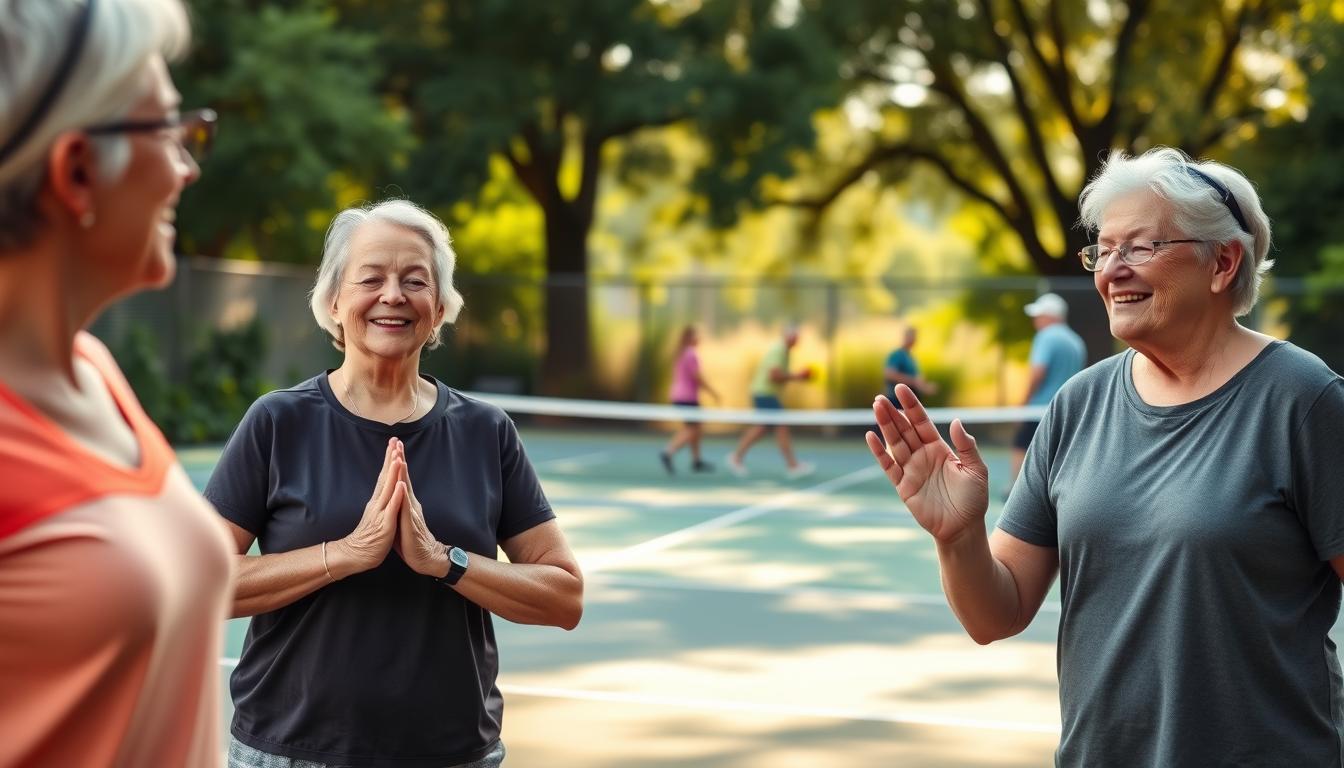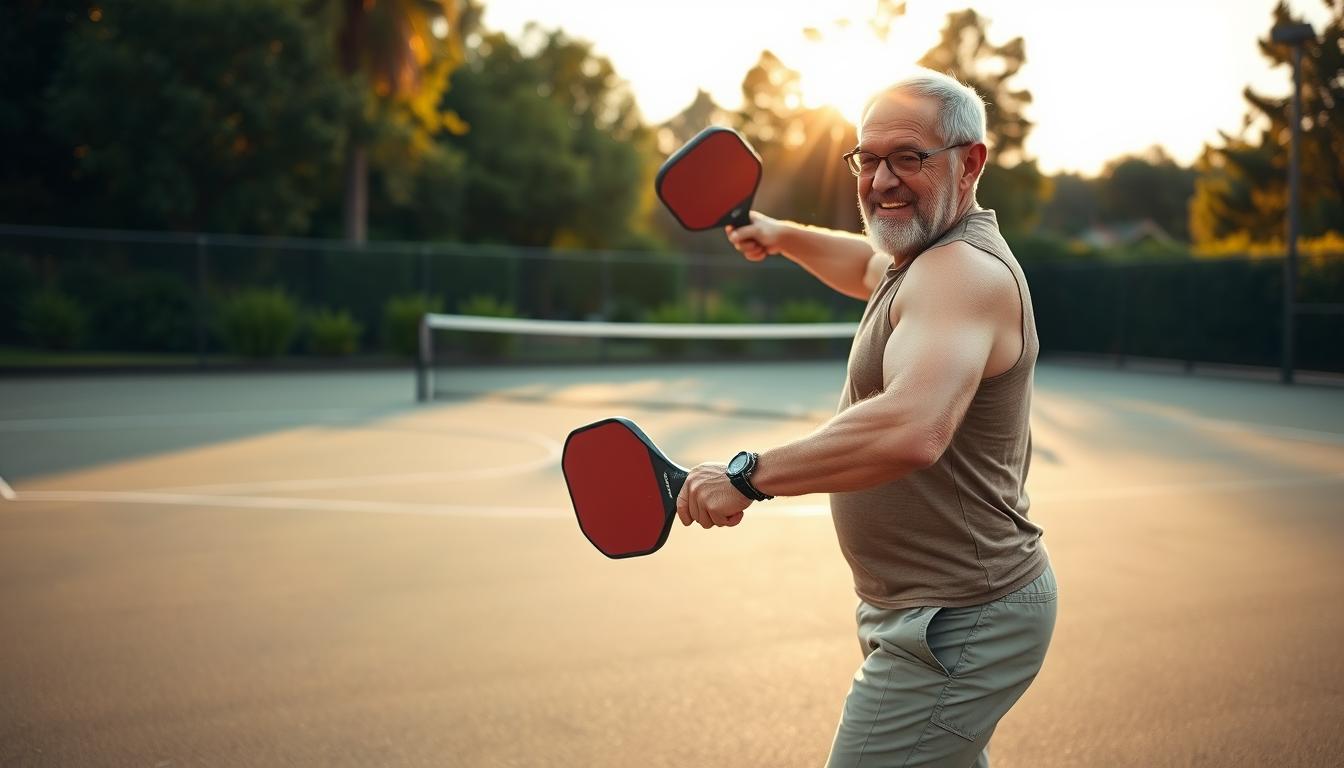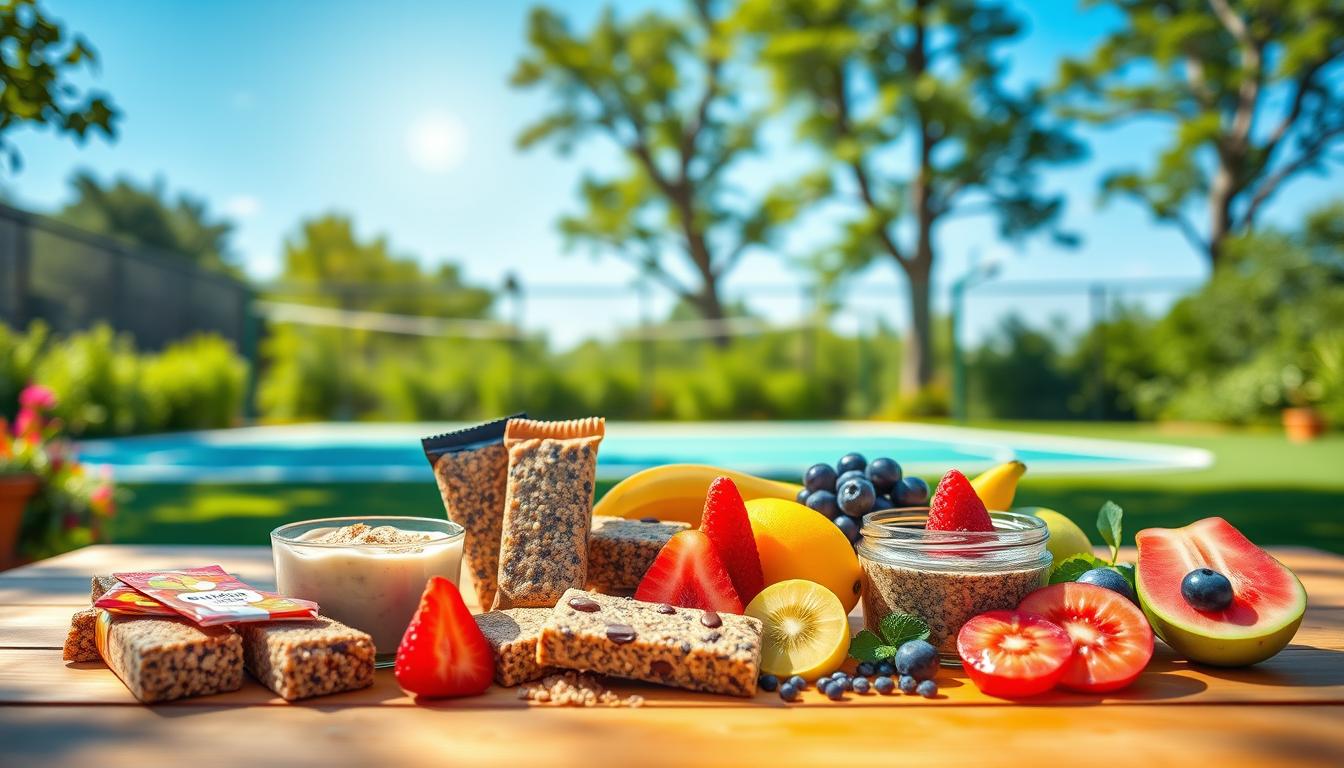Can a plant-based diet help with joint pain for senior pickleball players? As more older adults play pickleball, finding vegan joint pain relief is key. Studies show that eating anti-inflammatory foods can improve joint health. This can help reduce pain from active living.
In this article, we’ll look at how diet can help senior pickleball players. We’ll see how choosing the right foods can make playing easier and more fun.
Understanding Joint Pain in Senior Pickleball Players
Joint pain is a big problem for senior athletes, especially in high-impact sports like pickleball. As people get older, their joints naturally wear down. This is because the cartilage and connective tissues degenerate over time.
Conditions like arthritis, especially osteoarthritis, are common in older adults. These can cause pain, stiffness, and swelling in the joints.
Pickleball’s fast movements and sudden stops can make joint pain worse. Senior players often say their joints hurt after playing hard. The sport’s nature can lead to more injuries and discomfort.
For seniors with arthritis or joint issues, knowing the causes of pain is key. This knowledge helps them find ways to reduce pain and move better on the court.
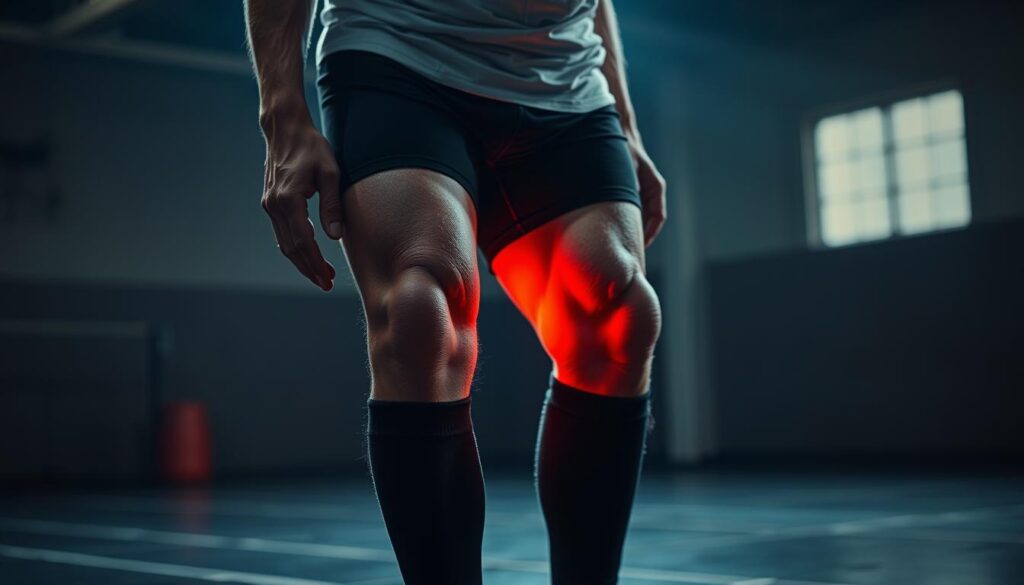
The Impact of Diet on Joint Health
It’s important to know how diet affects joint health, especially for senior pickleball players with joint pain. A vegan diet can give you the nutrients you need for better joint function and less pain. Plant-based foods have anti-inflammatory properties that help with joint inflammation and improve mobility.
How Nutrition Affects Joint Functionality
Good nutrition is key for joint health. A vegan diet provides nutrients that help keep cartilage healthy and reduce injury risk. Studies show that eating fruits, vegetables, and whole grains can improve joint function. These foods fight oxidative stress and inflammation, helping you play pickleball better.
Key Nutrients for Joint Support
To keep your joints healthy, include these nutrients in your vegan diet:
- Omega-3 fatty acids – Found in flaxseeds and walnuts, they have strong anti-inflammatory effects.
- Vitamin C – Important for collagen, found in citrus fruits and bell peppers.
- Vitamin D – Helps with calcium absorption, found in fortified foods and sunlight.
- Magnesium – Good for muscles, found in leafy greens and whole grains.
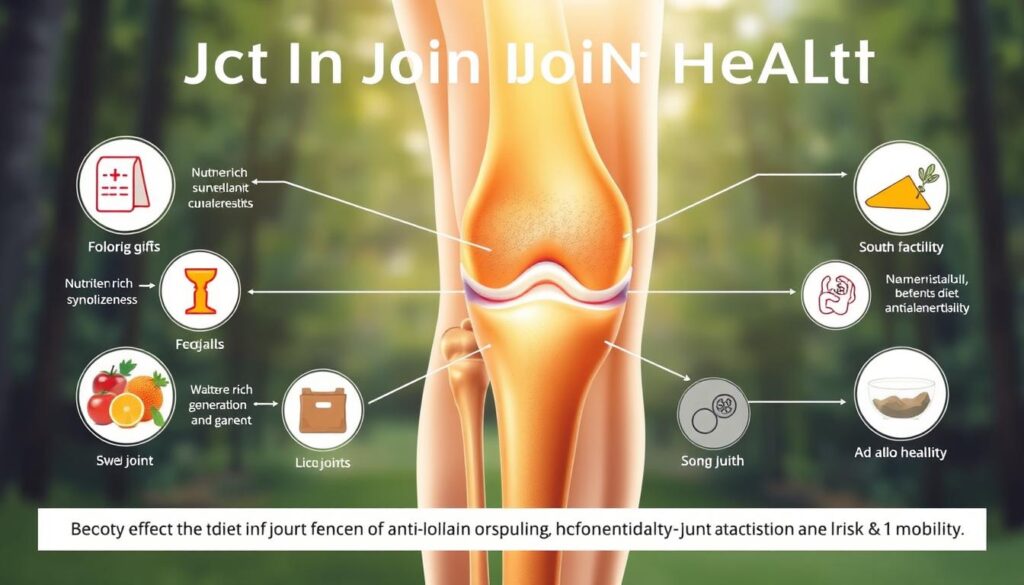
Eating these nutrients daily can help your joints work better and feel more comfortable. This lets senior athletes stay active and enjoy their games.
Why Vegan Diets Work for Joint Pain Relief
Vegan diets are known for their health benefits, especially for joint pain. They focus on anti-inflammatory foods that help joints work better. As more seniors, like pickleball players, try plant-based nutrition, it’s important to understand its benefits.
The Role of Anti-Inflammatory Foods
Anti-inflammatory foods are key in vegan diets. They help reduce chronic inflammation that can cause joint pain. Foods like berries, nuts, and leafy greens are full of antioxidants. They fight oxidative stress and support overall health, helping seniors stay active.
Benefits of Whole Foods and Plant-Based Nutrition
Whole foods are at the heart of plant-based nutrition. They include fruits, vegetables, legumes, and grains. These foods are rich in fiber, vitamins, and minerals that boost health.
They help with joint pain by supporting the body’s systems and aiding digestion. Eating less processed food also keeps inflammation in check. This is crucial for seniors who play sports like pickleball.
Vegan Joint Pain Relief Pickleball Seniors: Effective Strategies
Seniors playing pickleball can benefit from vegan strategies for joint pain relief. Eating a plant-based diet can help reduce inflammation and improve mobility. By combining diet changes with daily routines, athletes can see big improvements on the court.
Meal planning is crucial for seniors to get the right nutrients for joint health. Eating whole, unprocessed foods like berries, leafy greens, and nuts is key. These foods support overall health and help manage joint pain.
Staying hydrated is also important. Drinking enough water helps keep joints lubricated, reducing pain during play. Seniors should drink plenty of water all day, especially before and after playing pickleball.
Exercise is another vital part of managing joint pain. Low-impact activities like yoga or swimming improve flexibility and strength without harming joints. These exercises help seniors stay active and enjoy playing pickleball.
By adopting these vegan strategies, seniors can take a proactive step in managing joint pain. This approach helps them keep their passion for pickleball alive.
Incorporating Leafy Greens into Your Diet
Leafy greens are key for a vegan diet, especially for seniors wanting to boost joint health. They are full of nutrients that fight inflammation. This makes them crucial for keeping joints healthy and overall well-being.
Top Leafy Vegetables for Joint Health
- Kale: Rich in vitamins K and C, kale supports bone strength and reduces inflammation.
- Spinach: High in antioxidants, spinach contributes significantly to joint health and provides calcium.
- Collard Greens: These greens are loaded with essential nutrients that help maintain joint functionality.
- Swiss Chard: Packed with magnesium, Swiss chard promotes muscle relaxation and joint comfort.
- Arugula: This peppery green adds flavor while providing anti-inflammatory properties.
Creative Ways to Add Greens to Your Meals
Adding leafy greens to your meals can be fun and good for you. Here are some ideas:
- Green Smoothies: Blend spinach or kale with fruits like bananas and berries for a nutrient-packed breakfast.
- Salads: Create a base of mixed greens topped with colorful vegetables, nuts, and a simple dressing.
- Wraps: Use large leafy greens as wraps filled with hummus, avocados, and your favorite veggies.
- Soups: Stir in collard greens or Swiss chard to soups for added nutrition and flavor.
- Stir-fries: Include leafy greens in stir-fries along with other vegetables and tofu for a satisfying meal.
Exploring Omega-3 Sources in a Vegan Diet
Omega-3 fatty acids are key for joint health, especially for senior pickleball players. While fish is a common source, vegan options are available. Flaxseeds and chia seeds are great, offering lots of omega-3s for joint pain relief.
Adding these seeds to your diet is easy and fun. Mix ground flaxseeds into smoothies or oatmeal for a healthy start. Sprinkle chia seeds on salads or mix them with yogurt for a tasty omega-3 boost. These foods help reduce inflammation, making sports more comfortable.
Walnuts and hemp seeds are also vegan omega-3 sources. They add variety to your diet and help with arthritis symptoms. Here’s a table comparing these vegan omega-3 sources.
| Source | Omega-3 Content (grams per serving) | Additional Benefits |
|---|---|---|
| Flaxseeds | 2.4 | High in fiber and lignans, supports heart health |
| Chia Seeds | 5.0 | Rich in antioxidants, excellent source of protein |
| Walnuts | 2.5 | Contributes to brain health, good source of antioxidants |
| Hemp Seeds | 1.0 | Contains a balanced ratio of omega-6 to omega-3, aids in muscle recovery |
The Benefits of Legumes and Beans for Joint Pain
Adding legumes and beans to a vegan diet is great for joint pain. They are packed with high-quality protein, which is key for muscle repair and recovery. This is especially important for senior athletes. They also help reduce inflammation, which is good for easing joint pain.
High-Protein Options for Repair and Recovery
Legumes are a top protein source for plant-based diets. Foods like chickpeas, black beans, and lentils help muscles recover. They are essential for repairing tissues, especially after playing pickleball, keeping athletes at their best.
How Beans Can Help Fight Inflammation
Beans have special anti-inflammatory properties that help with joint issues. Their fiber and antioxidants work together to fight inflammation. Eating legumes regularly can really help reduce joint pain, improving overall health.
| Type of Legume | Protein per cup (g) | Anti-Inflammatory Benefits |
|---|---|---|
| Chickpeas | 15 | Rich in vitamins and minerals that reduce inflammation |
| Black Beans | 15 | High in antioxidants that combat oxidative stress |
| Lentils | 18 | Contains polyphenols that lower inflammatory markers |
| Kidney Beans | 13 | Rich in fiber, promoting gut health and reducing inflammation |
Whole Grains: The Unsung Heroes for Senior Athletes
Whole grains are key for boosting energy and joint health in senior athletes, especially in pickleball. Foods like oats, quinoa, and brown rice are full of nutrients. They help improve how well athletes perform.
These grains are rich in magnesium, fiber, and vitamins. They help the body work better. This is great for staying active and healthy.
Whole grains do more than just give energy. They keep blood sugar stable. This means athletes can stay active for longer without hurting their joints.
To show how whole grains help, here’s a table of their nutrients and benefits:
| Grain | Nutrient Content | Benefits |
|---|---|---|
| Oats | Fiber, Magnesium | Supports digestion, enhances energy levels |
| Quinoa | Protein, Essential Amino Acids | Boosts muscle recovery, improves performance |
| Brown Rice | Fiber, B Vitamins | Promotes steady energy release, supports metabolic health |
Eating whole grains every day helps senior athletes. They get the nutrients they need for strong joints and energy. This makes them perform better and live better lives.
Fruits and Vegetables That Promote Joint Health
Eating a variety of fruits and vegetables is key to keeping joints healthy. These foods are full of antioxidants and nutrients that boost overall health. A colorful diet supports joint health and improves life quality for seniors.
Top Fruits for Reducing Inflammation
Some fruits are great for fighting joint pain due to their anti-inflammatory properties. Here are some good choices:
- Berries: Blueberries, strawberries, and blackberries are rich in antioxidants that combat oxidative stress.
- Cherries: Tart cherries are known for their ability to reduce inflammation and lower uric acid levels.
- Oranges: Packed with vitamin C, they help maintain collagen levels crucial for joint health.
- Pineapple: Contains bromelain, an enzyme with demonstrated anti-inflammatory effects.
How to Create a Colorful, Nutrient-Rich Plate
Making meals colorful and nutritious is easy. Fill your plate with different colors to get a variety of nutrients. Here are some tips:
- Choose a mix of dark leafy greens, like spinach and kale, alongside colorful vegetables such as bell peppers and carrots.
- Incorporate fruits as a side dish or dessert, selecting options that reflect a broad spectrum of colors.
- Plan meals around seasonal produce to enjoy the freshest and tastiest options available.
- Experiment with different cooking methods, such as roasting, steaming, or grilling, to enhance flavor and nutrients.
Staying Hydrated: The Key to Joint Health
Drinking enough water is key for joint health, especially for older pickleball players. Not drinking enough can cause dehydration. This can lead to more joint pain and less athletic ability.
It’s important to keep an eye on how much water you drink each day. Drinking water often and listening to your body’s thirst signals is a good rule. Also, using electrolyte drinks can help replace lost minerals, keeping your body balanced and hydrated.
Drinking water helps keep joints lubricated, reducing stiffness and pain. Playing sports like pickleball requires staying hydrated to perform well. By focusing on hydration, older players can enjoy the game more and play longer.
Importance of Supplementation for Senior Vegans
When seniors switch to a vegan diet, they need to focus on getting enough nutrients. Supplements are key to filling gaps in their plant-based diet. They help ensure they get enough vitamin B12, omega-3s, and vitamin D.
Essential Nutrients to Consider
Vitamin B12 is crucial for vegans. It’s mainly found in animal products, so seniors need supplements. Without enough B12, they might feel tired, have trouble thinking, and face nerve problems.
Omega-3s are important for fighting inflammation. Since they’re often found in fish, vegans can use algae-based supplements or fortified foods. Flaxseeds and walnuts are also good plant-based sources.
Seniors might also need fortified foods for vitamin D and iron. These supplements can help improve their health and performance. They can also lower the risk of not getting enough nutrients.
| Nutrient | Importance | Vegan Sources |
|---|---|---|
| Vitamin B12 | Supports nerve function and red blood cell formation | Fortified cereals, nutritional yeast |
| Omega-3s | Reduces inflammation and supports heart health | Algal oil supplements, flaxseeds |
| Vitamin D | Bone health, immune function | Fortified plant milk, supplements |
| Iron | Helps in red blood cell production | Legumes, lentils, fortified foods |
Strength Training and Flexibility Exercises for Injury Prevention
Senior pickleball players should add strength training and flexibility exercises to their routine. These help prevent injuries and keep joints healthy. They make muscles around the joints stronger, lowering injury risk. Strength training also helps stay balanced during games.
Flexibility exercises boost range of motion and performance. This is key for better gameplay.
Key Exercises to Include in Your Routine
Exercises targeting major muscle groups are crucial for stability. Here are some top picks:
- Squats to increase leg strength
- Pliés for hip and leg flexibility
- Planks to enhance core stability
- Wall push-ups for upper body strength
- Balance exercises such as single-leg stands
The Role of Stretching in Joint Health
Stretching is essential for joint health and injury prevention. It boosts flexibility, aiding in better movement in pickleball. Focus on stretching these areas:
- Hamstrings
- Quadriceps
- Hip flexors
- Shoulders
- Back muscles
Combining strength training and flexibility exercises is key for top health and performance in pickleball. Regular practice of these exercises supports long-term enjoyment of the sport and helps prevent injuries.
Community and Support for Senior Pickleball Players
Playing pickleball is more than just staying fit. It’s about connecting with others too. For seniors, joining a community can really boost their motivation to stay active. Sharing tips and stories helps everyone stick to a vegan diet and feel better overall.
The Benefits of Social Interaction
Being part of a community is key for seniors. It fights off loneliness and isolation. Playing pickleball with friends makes the game more fun and keeps seniors on track with their vegan lifestyle.
Finding a Support Network for Plant-Based Seniors
It’s easier than ever to find vegan groups or pickleball clubs. Many places have events just for seniors. These events mix fun, exercise, and healthy eating, creating lasting friendships.
Success Stories: Seniors Who Found Relief through Vegan Diets
In the United States, more senior athletes are sharing their success stories. They talk about how vegan diets helped them with joint pain. These stories show how a plant-based diet can improve health and well-being.
Many seniors say they can move better and feel less pain after switching to vegan food. One athlete said a vegan diet helped with joint pain and gave them more energy. This allowed them to play pickleball better.
These stories are inspiring for those dealing with joint issues. They show not just physical benefits but also mental and emotional gains. As more seniors share their experiences, it’s clear that vegan diets can lead to a healthier life.
Tips for Transitioning to a Vegan Diet for Joint Relief
Switching to a vegan diet can help senior athletes with joint pain. It takes time and effort to get used to new eating habits. Making small changes can make the transition easier and keep you on track.
How to Make Simple Dietary Changes
Begin with small, easy changes to your diet. Here are some tips:
- Start slowly: Replace meat and dairy with plant-based foods gradually. This helps your body adjust.
- Explore new recipes: Try different vegan recipes to keep meals interesting and fulfilling. This keeps you motivated.
- Focus on whole foods: Eat more whole grains, fruits, vegetables, legumes, and nuts. They’re good for your joints and overall health.
- Listen to your body: Notice how different foods affect your joints and health. This helps you make better choices.
Resources for New Vegan Athletes
Having good resources can help senior athletes on their vegan journey. Here are some suggestions:
- Cookbooks: Find cookbooks that guide you on a plant-based diet or help reduce inflammation.
- Online forums: Join communities of people with similar dietary goals. They offer support and encouragement.
- Local vegan meet-up groups: Connect with others in your area. They can share meal ideas and support your journey.
Conclusion
Adopting vegan strategies can greatly help with joint pain for senior pickleball players. It improves their performance and quality of life. Plant-based nutrition helps reduce inflammation and brings many health benefits.
By eating whole foods like leafy greens, legumes, and whole grains, seniors can improve their joint health. This is the first step towards better joint health.
Also, lifestyle changes like staying hydrated, exercising regularly, and having social support are key. They help seniors live well and stay active. It’s important for seniors to try plant-based options and connect with others who value health.
By making these changes, seniors can enjoy pickleball and daily activities more. Vegan strategies and community connections lead to a more energetic and fulfilling life. Joint health becomes a shared goal among players.


